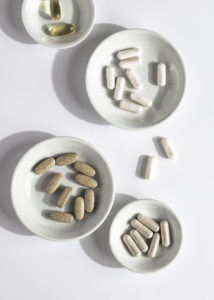Have you ever walked down the vitamins section in a grocery aisle and have been completely overwhelmed?
I read all the labels and think: “Should I be taking supplements?”, “What should I look for in a dietary supplement?”

Let’s start here with defining supplements:
- Dietary supplements are products intended to supplement your diet by adding nutritional value. Examples include vitamins, minerals, amino acids.
- Herbal supplements are a type of dietary supplement containing one more herbs that are made from things like plants, algae, and fungi.
In 1994, the Dietary Supplement Health and Education Act (DSHEA) classified dietary supplements as food. So what does this mean? The FDA cannot regulate as strictly as drugs.
Is this scary?
A little bit, but if you know what you are looking for, I can help ease some of the anxiety. Because dietary supplements are considered food, it impacts the way companies can market their products. For example, marketing statements can promote how it impacts the “structure or function of the body” but it cannot claim a “treatment of a condition”.
So if you can into a pharmacy store and receive recommendations from the store clerk based on supplement claims, proceed with caution and do some research before purchasing.
Here the TOP 3 THINGS to get you started:
- Supplements are classified as food, so they are not FDA approved. However, the manufacturers and distributors are responsible for ensuring their products are safe and that their label claims are accurate. Unfortunately, they do not have to prove they are effective. They must follow ethical manufacturing guidelines and must not contain harmful levels of contaminants. Look for one of these three Seals of Approval:
-
- Consumer Lab Approved Quality Product Seal
- NSF International Dietary Supplement Certification
- U.S. Pharmacopeia (USP) Dietary Supplement Verification Program
- Check the label for other ingredients. Some supplements may contain food ingredients, such as wheat, corn, eggs, or gelatin. If you have a food allergy or are sensitive to these foods, look for supplements that don’t have those ingredients.
- Many people think that drug interactions are only with prescription drugs. But some over the counter drugs can also interact with supplements. Taking a drug and supplement together may increase the drug’s effects. The drug’s effect may become too strong and unwanted side effects may increase.
The best thing you can do is talk to your health care practitioner and do some research to see what is best for you.
With gratitude,
Tara